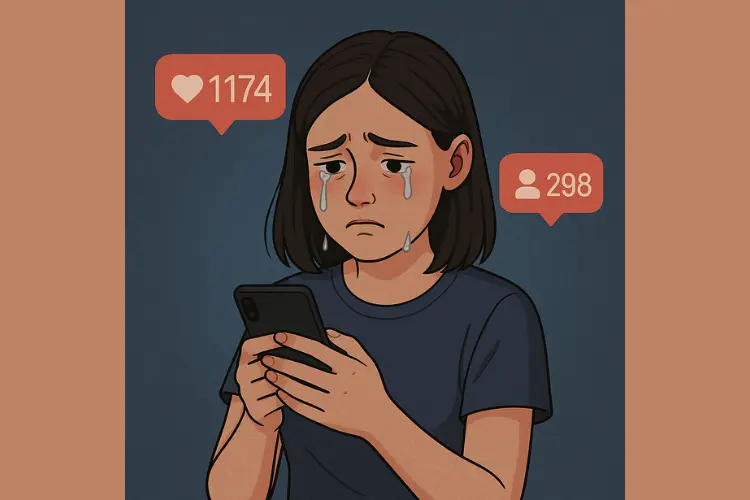Introduction
Social media is a central part of modern teen life. Instagram, Facebook, Snapchat, and TikTok are how teens connect, share, and express themselves. While these platforms offer entertainment and connection, too much time spent on them can be harmful. New studies show a strong link between excessive social media use and poor mental health in teenagers. This blog explores these risks and offers solutions for families.1. The Pressure to Stay Connected
Smartphones keep teens connected 24/7. Notifications from apps constantly pull their attention. Teens feel pressure to respond to messages, post updates, and check likes. This pressure creates a cycle where they feel they must always be online.
Just like adults feel pressure from work emails, teens feel stress from their digital social life. Being offline can feel like missing out. This fear, known as FOMO (Fear of Missing Out), keeps them glued to their screens, even during meals, family time, or late at night.
This constant connection reduces opportunities for rest and real-life interactions. Teens often check their phones in bed, reducing their quality of sleep. The stress of staying socially active online can also take a toll on their mental health.
2. The Link Between Social Media and Poor Sleep
Sleep is essential for mental and physical health, especially for growing teens. But social media use at night is disrupting teen sleep habits. Blue light from screens delays melatonin production. This hormone controls the sleep-wake cycle. As a result, teens stay up longer and sleep less deeply.
Notifications at night can also wake teens or prevent them from falling asleep. Many teens keep their phones next to them in bed. They wake up in the middle of the night to check messages or scroll through feeds. Over time, this disrupts their sleep routine.
Poor sleep leads to fatigue, difficulty concentrating, irritability, and even depression. These symptoms can harm school performance and personal relationships.
3. Emotional Dependency on Likes and Followers
Social media can shape how teens view themselves. Likes, shares, and comments become measures of popularity and worth. When teens don’t get the feedback they expect, they may feel rejected or not good enough.
This emotional dependency is dangerous. Teens begin comparing themselves to others. They see only the highlight reels of their peers’ lives. These comparisons can lead to low self-esteem and body image issues. Many teens also feel anxiety when their posts don’t perform well.
Some even delete posts that don’t get enough likes, seeing it as a failure. This behavior shows how deeply social media can influence self-worth. Constant comparison and the desire for approval can cause stress, anxiety, and even depression.
4. Alarming Findings from Recent Studies
Recent research paints a clear picture of the risks. A study published in July examined 753 middle and high school students. The results were alarming. Teens who used social media for more than two hours a day had higher rates of poor mental health. Some even reported suicidal thoughts.
This study isn’t alone. Other studies have found similar trends. Emotional investment in social media is linked to anxiety, depression, and low self-esteem. The more time teens spend online, the more likely they are to feel isolated or unhappy.
These findings suggest that social media isn’t just a harmless pastime. When used excessively, it becomes a mental health risk factor.
5. What Parents Can Do
Parents play a crucial role in helping teens navigate the digital world. The first step is awareness. Understand how much time your teen spends on social media and how it affects them emotionally.
Start by setting healthy boundaries. Create tech-free zones and times, especially before bedtime. Encourage family meals without phones. Use screen time tools to monitor and limit usage.
More importantly, lead by example. If teens see parents constantly on their phones, they’ll do the same. Show them what balance looks like. Prioritize face-to-face conversations, hobbies, and outdoor activities.
Teach teens that their worth isn’t tied to online popularity. Encourage them to take breaks from social media and focus on real-life relationships. Praise effort and character rather than online success.
Open communication is also key. Talk about the emotional impact of social media. Let teens know it’s okay to feel overwhelmed. Support them if they decide to reduce their screen time.
Conclusion
Social media isn’t going away. It can be a fun and useful tool for connection. But when overused, especially by teens, it can damage mental health. The evidence is clear: too much social media leads to poor sleep, low self-esteem, and higher anxiety.
Parents must act as guides. Teach teens how to set boundaries and value themselves beyond likes and followers. Unplugging more often can restore balance and boost well-being.
One way families can take control is by using tools like CleanRouter. CleanRouter helps parents manage online activity, filter harmful content, and set healthy limits. It’s a smart step toward creating a safer, more balanced digital life for teens.
Let’s help the next generation thrive—online and offline.




